- Hey Dullblog Online Housekeeping Note - May 6, 2022
- Beatles in the 1970s: Melting and Crying - April 13, 2022
- The Beatles, “Let It Be,” and “Get Back”: “Trying to Deceive”? - October 22, 2021
NANCY CARR * That headline about Keith Richards calling Sgt. Pepper’s “rubbish” in an Esquire interview — I’ve finally seen it enough times to post about it. I’m mostly inclined to give Richards’ opinion of the album the big shrug. Some people are going to prefer the Beatles, others are going to prefer the Stones, and that’s how it’s going to remain. But here’s the relevant quote, and a few observations about it.
[Note: Scott Raab is the interviewer; one of the first things he says to Richards is “I brought a miniature joint, but I’m not thrusting it upon you. I just thought it would be wrong to meet you and not bring a little something.” Just to give you the flava.]
Esquire: “I’ve been thinking about Rubber Soul, Revolver, Sgt. Pepper, and The White Album and listening to Beggars Banquet, Let It Bleed, Sticky Fingers, and Exile on Main St. Over the past 20 years, I’ve listened to that Stones stuff far more often.”
Richards: “No, I understand–the Beatles sounded great when they were the Beatles. But there’s not a lot of roots in that music. I think they got carried away. Why not? If you’re the Beatles in the ’60’s, you just got carried away–you forget what it is you wanted to do. You’re starting to do Sgt. Pepper. Some people think it’s a genius album, but I think it’s a mishmash of rubbish, kind of like Satanic Majesties–“Oh, if you can make a load of shit, so can we.”
My observations:
- It’s rather sad when your interview–with someone who’s as much of a fan as Raab clearly is–grabs headlines only because of your opinion of another band’s 48-year-old album. “Also talks about his new solo album, Crosseyed Heart, and riffs on stamina, image, the blues, the road, and working” gets relegated to the subhed.
- His reference to Satanic Majesties as a response to Sgt. Pepper’s underlines who was leading and who was following in 1967/1968.
- One of the roots of the Beatles’ music is the British music hall tradition; the Stones roots are transplanted from America. Sgt. Pepper’s also features Indian roots (“Within You and Without You”) and at least one song (“A Day in the Life”) that is the kind of genius leap forward roots can’t account for.
My questions: At what point does Richard think the Beatles stopped being the Beatles? What exactly does he think they got “carried away” from? And why does he think it would have been better if they hadn’t gotten “carried away”? Discuss.

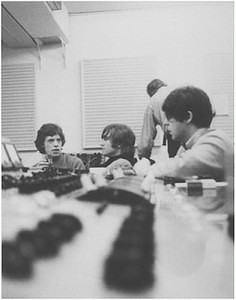
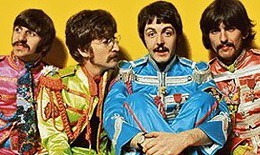

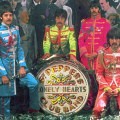


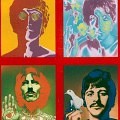
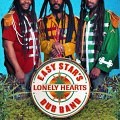





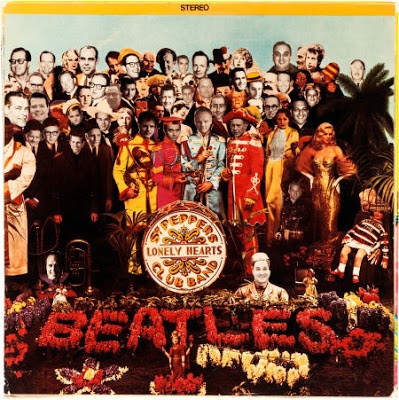
I suspect this might be a case of Richards talking more about himself than about The Beatles. The Stones really did “lose their way” in ’67, specifically with Satanic Majesties, which of course was a direct response to what The Beatles were doing. I also think there was some of this going on in ’66, with Aftermath and Between the Buttons getting into some psychedelic territory that just didn’t work very well for them (IMO). Once they got past that imitative stage, they went on to produce their best work. It’s as if they lifted the burden of imitating The Beatles from their shoulders and decided just to be themselves.
So in short, I think this is a case of “Pointing the finger and having three more pointing back at yourself”. Richards correctly remembers that period as the Stones straying from their roots and being derivative and chasing fashion. He seems to have forgotten that it was The Beatles who were setting that fashion.
Ah, Keef. He’s just bein’ himself. John Lennon famously said he’d trash their entire oeuvre and start over. McCartney had to lecture him about that. I never agree with most musician’s analyses of their music once they’ve finished making it. “The author should die immediately upon finishing the work, so as not to disturb the transmission of the text.” — Umberto Eco
@Nancy, I worked up a whole post on this, then I got hit with a case of the “who the fuck cares?” I know, I know, that’s anathema on the internet, but I was raised on print and sometimes my perspective gets the better of me. Still, in case any of you DO care, here are my raw thoughts. To call them “half-baked” would be generous, but maybe they’ll be fun?
“Keith Richards seems like a nice enough gent, certainly the most interesting man in Weston, CT, but there are only two subjects upon which he can speak with any authority: his own love of the blues, and dental problems caused by IV drug use. He is fascinating, in the same way a man who has been struck by lightning fourteen times might be. But it suggests a real paucity of creative depth when the most interesting thing about a 71-year-old artist is, “Can you believe he’s still alive?”
Since you need more than that for an interview, Esquire’s fawning Scott Raab first offers him a joint. I like this. I would’ve fawned, too, and I certainly would’ve offered Keef a joint. Actually I would’ve brought a 420 bar from the Venice Cookie Company, the only thing I know strong enough to penetrate Richards’ likely adamantine tolerance.
Keef, sensing a narc, demurs. So the interviewer unearths the old Stones vs. Beatles debate:
I’ve been thinking about Rubber Soul, Revolver, Sgt. Pepper, and The White Album and listening to Beggars Banquet, Let It Bleed, Sticky Fingers, and Exile on Main St. Over the past 20 years, I’ve listened to that Stones stuff far more often.
No, I understand—the Beatles sounded great when they were the Beatles. But there’s not a lot of roots in that music. I think they got carried away. Why not? If you’re the Beatles in the ’60s, you just get carried away—you forget what it is you wanted to do. You’re starting to do Sgt. Pepper. Some people think it’s a genius album, but I think it’s a mishmash of rubbish, kind of like Satanic Majesties—”Oh, if you can make a load of shit, so can we.”
Yeah…kind of like Satanic Majesties, only one of the greatest albums of all time.
So here’s the obvious follow-up the interviewer doesn’t ask: if the determiner of great music is how rootsy it is, isn’t Robert Johnson a priori better than anything the Stones ever did? Why hold Sgt. Pepper to this standard and not, oh, “Satisfaction”? Do Mick and Keith get a pass, simply because they never realized how tremendously bullshitty it is when fabulously wealthy Englishmen dripping with white-skin privilege claim honorary African American status?
This interview is what bugs me about the Stones, and so many Stones fans; in it, the interviewer (a self-described “white boy from the suburbs”) gleefully swallows the Stones’ central hustle: that their genuine love of black American blues confers on them some sort of extra bone-deep realness — while studiously avoiding the obvious conclusion that this makes the Stones inherently inauthentic, because they’re NOT black Americans. Mick Jagger isn’t from Mississippi, he’s from the London School of Economics. And yet because he taught himself how to “sing black,” the Stones’ legions of mostly white, mostly middle-class classic rockin’ fans still thrill to the Stones’ supposed transgression, which at this late date, is rooted in an indefensibly racist stereotype. All the 60s English rockers, including John Lennon, are annoying when they namecheck bluesmen, because it’s the world’s biggest humblebrag.
Don’t get me wrong: when you were an English kid in 1961, listening to Chicago blues certainly did mean that you were open to cultural influences others were not. That was a good thing. But to still be stuck there fifty years later, as if the whole world hasn’t changed is…peculiar. It’s like saying all Jews are good with money, and not understanding when people call that stereotyping.
Once you get past treating all African Americans as the exotic other, and stop playing the fundamentally racist game of giving them more authenticity, more sexual license, and more access to emotion because of the color of their skin — which is just the other side of Jim Crow — the Stones’ connection to electric Chicago blues music becomes at best value-neutral. It’s like The Beatles’ playing Arthur Alexander, or The Isleys, or for that matter Meredith Wilson. It’s just music, man.
But the moment it becomes about the music, and only the music, the Stones become very, very boring. The playacting at the heart of their story is revealed as a kind of marketing, white teenage male wish-fulfillment. If Keith Richards thinks Sgt. Pepper is rubbish, it shows he hasn’t changed since 1963 which, for someone who’s lived the life he’s lived, is a terrible indictment.
The Stones aren’t cool. The Stones are The Man.
Think about it, when were the Stones ever about liberation? Where were the Stones, those lovers of southern African American culture, during the Civil Rights movement? The Beatles didn’t stop touring because they got fucked out (as Keith seems to assert in the interview) but because the backlash to their political opinions was getting ugly, violent, deadly. The Stones, ever-politic, stayed a million miles away from all that.
The Stones are The Man. The Stones aren’t about liberation for anybody but the Stones. They are and have always been a utterly ritualized, utterly safe cartoon of male power — like pro sports or wrestling. The Beatles were from the very beginning all about identifying with the feminine; and in a patriarchal society, that’s real revolution.
When Mick and Keith went to jail, it was for drugs, not politics — and the moment they entered the legal system, the powers that be gave them a good sniff and decided, “These guys are no threat. They can go.” Contrast that to how Lennon’s “Jesus” comment went down, or how the FBI treated him later.
In the wake of the Beatles, the Stones came along and made rock safe for all the guys who didn’t want to evolve. It’s impossible to listen to the Stones and not hear how much they dislike women, how much they fear female power, and how their world is an entirely masculine one — that’s what Jagger’s bisexuality is about. It’s immaturity, not license. And their whole ooky-spooky Satanist phase coincides with the birth of Women’s Lib; it was the Stones desperately trying to stay on top, searching for a new source of power in a world where the rules were changing.
Stones fans have to face facts: the Stones are the shitty side of the sixties, freedom if you were white and male and straight and middle class or higher. Everybody else remains firmly under the thumb.
Don’t get me wrong, the Stones made some great tunes. They were an essential part of the sixties scene, and we’d miss something if they’d never existed. But lionizing them, as most of the world now does, requires one to studiously ignore everything but one very narrow narrative created by Andrew Oldham in ’63 and pumped out by Stones, Inc. ever since. It requires a kind of petulant anti-curiosity, a willful insistence not to think, the willingness to live inside a comforting narrative long after you know it’s bullshit. In other words, the mindset that has dominated the U.S., and especially baby boomers, beginning with Reagan.
The Beatles are a triumph of art. That’s why they had to break up. The Stones are a triumph of marketing, and that’s why they’ve kept going, replacing, repackaging. The Beatles were, after 1966 or so, unmarketable, they changed too fast and weren’t aimed at any single demo. The Stones never faced this problem of artistic growth, and it’s emblematic of our era that one, nobody ever mentions this, and two, we all are encouraged to celebrate it. That’s what Keith means by “rubbish” — to him Pepper seems off-message. A stupid move. Blurring the brand.
There’s a fundamental cynicism to Mick and Keith that’s unseemly in a couple of guys who won the goddamn lottery. They’re nothing but self-satisfaction. The Beatles at their best, encourage you to be better than you are. The Stones don’t have the stones for that. Just what was the street man fighting for? 45 years later we know: he was an agent provocateur. The idea that you can– and should–fight for something more is at the heart of the difference between the Bands, and that difference began to emerge most clearly in the 1966-67 period. That’s why Keith really thinks “Sgt. Pepper” is rubbish, and how the Stones had to pay psychedelia back with aggression. But street fighting… that’s exactly what the Man wants you to do, whether it’s 1968 or 2015. You get rocks. He gets tanks. He wins.
But you know what really bugs me? I think it’s the scorn. I’m not English, so I’m guessing, but to me Keith’s comment seems like English “hammering down the nail” in its purest form. It’s a non-U version of snobbery. How dare you change? How dare you want more? How dare you aspire to Art?
Does any of this sound like a rock and roll rebel? No — this is the voice of The Man.”
Although the headline is rubbish, and the rest is just Keith’s opinion – sometimes valid, but I can’t help thinking that his contempt for Sgt. Pepper’s is just a deep regret for having made such a lousy copy a few months later –, there could be a good discussion about beatle roots. The Guardian recently published a good piece about this topic:
http://www.theguardian.com/music/2015/jul/31/no-bono-the-beatles-not-irish-but-american
But I could not disagree more with Mike Gerber on the “marketing” topic. The Beatles could be anything but unmarketable. Abbey Road sold 6 million copies; that’s not exactly unmarketable. Also, the image of the Beatles as revolutionaries (which ensured their endurance as pop icons) comes from their post-Help! records and attitudes. (Which is not quite fair, in my opinion, because I always thought the real pioneers were the moptops who may seem naïve now, but recovered pop music from oblivion and from the twist.)
Also, I think you could see a great leap in the Stones’ artistic career once they stopped following the Beatles’ path. From Beggar’s Banquet to Exile, they made really great records. And then they died.
@Rafael, don’t confuse “unmarketable” with “unpopular.” The Beatles’ sales were based on their music, which was fantastic, and their “installed user base” — that is, self-identified Beatles fans who’d bought every Beatles LP since 1962, and weren’t going to stop as long as the product was reasonably good.
To get an idea of “installed user base,” we can get a good guess from the first-year sales of “The Beatles Again” (“Hey Jude”), the ABKCO-created hodge-podge released in 1970. By the end of its first year, the album had sold 2,321,769 copies in the U.S. And to get an idea of the multiplicative effect that great music has on sales, contrast Abbey Road: “In June 1970, Allen Klein reported that Abbey Road was the Beatles’ best-selling album in the US with sales of about five million.” So, as of 1970, The Beatles could basically count on 2m+ within the first year every time they released an LP; and if they released a classic, 2x to 3x that.
But from a commercial standpoint, changing the packaging and tinkering with the product is a very risky thing, especially in a fickle mass-market business with a lot of me-too and relentless competition. At the mass-market level, consumers want standardization and predictability over quality — that’s why McDonald’s is what it is, while your local burger shop is probably tastier. The Beatles’ utter dominance of the pop music game in 1964 led to a massive reaction, and over time the Beatles’ competitive advantage eroded. Yes, the total market was growing, but there was ever-more competition, and it was making ever-better music.
If you want to tease out how marketing and standardization worked in the Beatles’ early success, we have a great tool: The Monkees. As with The Beatles Again, The Monkees are an application of standard mass-market media techniques to the unique Beatles phenomenon. As we all know, it was an attempt to artificially create a group that filled the market niche that the Beatles had grown bored with and left after Help!. The Monkees were created to be charming, charismatic faces for Beatlish bubble-gum pop consumed by kids 8-15. This wasn’t art, it was commerce, and it was incredibly commercially successful: “At their peak in 1967, the band outsold the Beatles and the Rolling Stones combined.”
The Monkees were, essentially, the 1964 Beatles without the musical genius — without Lennon’s anger, or Paul’s musical restlessness, or George’s dourness, or Ringo’s… well, Ringo was always perfect from a marketing standpoint, which is why rock-snobs always diss him. (It’s not his fault; that’s a kind of genius, too.) The Monkees’ non-problematic image and state-of-the-art pop was multiplied by TV; and their incredible success shows just what a profitable niche the Beatles had left.
But for what? Nothing, it seemed. We forget now how ominous 1966 was for the Beatles; we listen to Revolver and assume everyone then could tell what would happen next. But at the time, the commercial future of the group was highly, highly in doubt. No group like them had lasted; competition was fierce and growing fiercer; they were growing more individual (growing apart?) with every album; and no group had ever successfully transformed itself. The change from Help!-era moptops to Strawberry Fields/Penny Lane is remarkable; to do it in 18 months is incredible; and to somehow manage to retain mass-market popularity throughout is really without equal in modern pop culture. And it was an incredible gamble, which the Beatles wouldn’t, and couldn’t, have done if they cared at all about their marketability. The Monkees made good business sense; The Stones made good business sense; but The Beatles and Dylan were just… out there, artists doing what they wanted, and trusting that people would follow. Or not.
I believe this is why Brian Epstein famously asked for “brown paper bags for Pepper.” He was a marketing man to his bones, and felt that if the fans could listen to the music, they would be won over; but there was a chance that the vast change in the Beatles’ image (individuality, glasses on Lennon, moustaches, alliance with the drug- and counterculture 100x more obvious than on Revolver) would turn fans off. What Epstein didn’t know, couldn’t know, was that the Beatles were geniuses, and were as in-tune with their fans in June 1967 as they had been in June 1964. That they were able to pull it off seemingly without effort should never blind us to how audacious, unprecedented, and risky, that transformation was. And that the whole thing was led by Paul — supposedly the success- and image-conscious one, supposedly Mr. Showbiz — has never been adequately noted. I say for the millionth time: who IS this Paul McCartney guy, anyway?
Satanic Majesties is the Stones’ nadir not because the music is bad (I actually like it), but for how it unmasks the Stones as closer to the Monkees than the Beatles — a fundamentally commercial enterprise, rather than an artistic one. It shows them as the inauthentic, calculating creators they are. Pepper is what it is because that’s what John, Paul, George and Ringo authentically dug at the time, and if people didn’t like it, fuck ’em. Pepper is a great big fuck-you to everything that had worked for the Beatles since 1962. All the sudden they weren’t interchangeable; they weren’t cuddly; they weren’t unthreatening; they weren’t just four lads from Liverpool. All the sudden they’re four deeply weird guys dressed like freaks who’d “love to turn you on.” John’s some sort of dark wizard; Paul’s making electric music hall; George is off in India; only Ringo’s recognizable. When the Beatles said fuck you to their moptop marketability, they were saying fuck you to the entire music business as it existed then — and they were saying it because they knew the alternative was endless self-copying, artistic death.
Satanic Majesties is exactly the opposite; it is the Stones letting an outside perception of hipness/trendiness determine what Stones music is. And then when that trend was over, the Stones reverted back to the formula they knew worked. Even in the case where the Stones are making superb rock and roll — “Jumpin’ Jack Flash”/”Sympathy for the Devil” — their change and growth is really not very much, compared to the Beatles’; but then again, you could say that about nearly any artist.
TL;DR–The Beatles really are amazing, says blogmom of a Beatles blog. Oh, and I totally agree that the Beatles circa ’63-’64 were revolutionaries. Without question. Then they did it again with Pepper.
Mike wrote: “The Beatles were from the very beginning all about identifying with the feminine; and in a patriarchal society, that’s real revolution.”
I wouldn’t go quite that far, but their openness to identifying with the feminine does seem to me to be behind some of the rhetoric about the Stones as tough/masculine/rootsy and the Beatles as soft/feminized/non-rootsy. It’s the “Beatles have girl cooties” dynamic we’ve talked about here before.
Who gets to identify what “roots” are, and what music constitutes “roots”? Why are some forms of music (e.g. British music hall) typically defined as “not roots,” while others (American blues) are “rootsy”? What’s really at stake in that kind of definition? I think you’re getting at this in what you said, Mike.
Rafael, that’s interesting about seeing the Beatles’ “moptop” phase as the really revolutionary one. My own sense is that what’s most revolutionary about the Beatles is that they couldn’t be pinned down. They changed a lot over their short lifespan as a recording band, and went in unpredictable directions. In contrast, to me there’s a sameness at the heart of the Stones that’s both their great strength and their limitation.
If you read Keith’s autobiography, he describes his dad as doing exactly the same thing every day of his working life. Then when he retired and went to live with Keith, he had a strict schedule that he never deviated from – ate the same food, watched the same TV shows every night until he died. It seems to me that his son is exactly the same – he eats the same food that he’s always eaten, listens to the same music and plays the same chords. The Stones dynamic has always been Mick’s restlessness vs. Keith’s stasis. Keith can play the same thing over and over again, and still find something new (or maybe something he forgot about), while the Beatles “never played the same thing once”. Even at the Cavern, they were changing their entire set every week. Sergeant Pepper was so far ahead of its time, some people still haven’t caught up.
Really insightful, @Dan.
In part the reason why I didn’t post on the topic is perhaps what you’re saying here; Richards didn’t get Pepper because of who he is, and who he is created “Satisfaction,” so I’m not so anxious to criticize. There’s a comfort in statis — and that comfort extends to being in the Stones, and to being a Stones fan.
@Dan… “If you read Keith’s autobiography, he describes his dad as doing exactly the same thing every day of his working life. Then when he retired and went to live with Keith, he had a strict schedule that he never deviated from – ate the same food, watched the same TV shows every night until he died. It seems to me that his son is exactly the same – he eats the same food that he’s always eaten, listens to the same music and plays the same chords. ”
After having read Keef’s autobiography myself, I’d also lean towards the same conclusion.
Why are we discussing ANYONE’s opinion that Sgt. Pepper was a load of shit?
Also @Michael, you are spot on to point out the Beatles’ artistic integrity/adventurousness vs playing it safe/cashing in on a formula (and to mention Dylan as another example of this). They were so remarkable in that adventurousness in the face of fame; and also in their ability to create so purely without, it seems, allowing the pressure of expectation to stifle or direct their art. They somehow kept the creativity flowing–allowing themselves to be influenced but never dampened or imitative. Well, they did imitate but it always came out Beatles. (eg Hide Your Love Away sounds nothing like Dylan, despite being written, we are told, under Dylan’s influence.)
I just knew that there would be some great dullblogging to enjoy when I saw the “Richards blasts Pepper” headlines. What can you say about Keith? He is great, I love him. He has always believed that the Blues are the only REAL music. I suppose that is what he is saying about the Beatles losing their roots- as if they were ever purists in any real sense. It goes back to the classic Northern Soul/ Southern Blues English thing that I’ve never quite grasped. Keith and Mick can do a brilliant interpretation of blues, country and reggae, but woe betide anyone who leaves the reservation and tries something different. It should come as no surprise that Keith dislikes Sgt. Peppers. Something tells me that he and Mick spent about a week listening to it nonstop and knew that their days of covering Chess records were over. I love old blues records myself, but I can’t imagine ingesting a steady diet of them or limiting myself to a few genres of music that somebody else deemed “legitimate” or “real”, or heaven forbid….”manly”. Having said that, I did pre order Crosseyed Heart!
Yes, of course it’s absurd to pick a music genre and claim it’s the only real one. A bit like saying there should only be the color green (or blue, in this case).
But as someone pointed out, The Beatles never “claimed” to be a blues band. I mean “Do You Want to Know a Secret” and “A Taste of Honey” were on their first album for Christ’s sake! They were never into Robert Johnson or Muddy Waters. And Keith never says the word “blues” (in what I read), only “roots.” By that he presumably really means early rock ‘n’ roll–like Chuck Berry and Little Richard–which was only part of The Beatles’ influence.
Also, as Ian McDonald pointed out somewhere I think, compared to its reputation as flowery and overdone, Sgt. Pepper is actually pretty lean. Every track counts–there’s nothing superfluous or overblown. It’s even stark in some places. It’s inventive, yes, but it’s also warm. I think it’s their warmest record. That’s one of the reasons I love it so much.
The Beatles–perhaps mostly because of Paul?–had the ability to obsess over songs until they were perfect without the result feeling overly polished. A raw exuberance and feeling of spontaneity stayed in the finished product–even if Paul played a bass line 65 times to get it right (which he did with either “A Little Help From My Friends,” or “Getting Better,” or both.) In that sense they stayed true and authentic and “real” no matter what genre name you slap on the music. Compare Beatles’ tracks to Eagles tracks. The Eagles were also perfectionists in the studio but the results feel processed and slick–there’s no playfulness, rough egdes, happy accidents left in. Keith was also a perfectionist of sorts. He drove his bandmates till he got the sound he wanted. But like McCartney, he knew when he’d captured the soulful heart of a song. I don’t think any band, black or white, played scratchy blues-rock on a par with the Stones.
Let us know how “Crosseyed Heart” is, @Kevin.
Another thing to remember about Paul/John and Mick/Keith, regarding roots, is that as young men,both pairs were committed. They didn’t have safety nets–no day jobs or degrees to fall back on. They put their lives on the line by making music “it.” That’s authentic.
Au contraire, @Chris. Mick Jagger spent 1961-1963 enrolled at the LSE, planning to go into business. (Read all about it here.)
Y’know, just like Muddy Waters or B.B. King. Growing up black — in the American South — during the Depression — they were naturally deluged with offers to attend prestigious universities en route to a comfortable life in the middle- to upper-classes. Not many people know this, but Howlin’ Wolf actually spent a year and a half at Wharton. He decided that he didn’t like wearing ties, so he dropped out and spent the rest of his career saying that other musicians were “sell-outs.” Music, for most bluesmen, was a teenage hobby that only became something more when it seemed possible to make a lot of money doing it.
I don’t mean to be a broken record about this, but even as late as 1963, the frontman of the Stones was clearly UN-committed to all the things Keef holds dear. It’s a testament to image-making that, 50 years later, you still have Stones fans who believe that the guy who waited until he had a record contract to drop out of LSE is more “rebellious” than four guys with no prospects who spent two years playing in shitholes filled with ex-Nazis.
The Stones only became the Stones because The Beatles had taken the risk, broken through, and brought rock and roll back to life. This doesn’t make the Stones lesser, necessarily, but it does mean that the whole “authenticity” thing is pure spin.
BTW, I just discovered Gavin’s website, but it seems loaded with good stuff. When we were at college ‘way back when, he started a great music paper called “Nadine: The Magazine That Wishes It Were A Band.” I’ll dig around for some good Beatle nuggets.
@Michael–so au contraire regarding one of the four, Mick. I read a bio of him but it was a while ago so I must have conflated living in the shit hole with Keith and Brian with dropping out of school. Keith, though, whose Life I think I’ve listened to now three times, was all in, I believe–no fall-back. And Paul and John for sure.
And yeah, the Stones were much more calculating in their career, particularly Mick. Brian was ultimately more interested in being a rock star than a musician, and Keith always had his Keith-swagger, which I think is partly who he is but also played up for effect. But there was more spin involved in general with them.
Keith is still at it, saying the Beatles at Shea Stadium “weren’t in sync with each other”
–
http://www.nydailynews.com/entertainment/music/keith-richards-plenty-plenty-article-1.2346653
–
This is pure PR from Keith. He’s got an album to sell, so the more trash he talks, the more people will be reminded that he’s still alive. That reminds me, doesn’t Dick Cheney have a book out? That’s why I’ve been hearing so much from him lately, as well.
If we talk about BLUES and Keith Richards I ask myself what to say about the people who understand the blues better then Keith Richarda and Rolling Stones,
1.Peter Green-Fleetwood Mac
2.Rory Gallagher.-Taste
3.Douane Allman-Allman Brothers Band
4.Ray Cooder-Captain Beefheard
5.Jimmy Hendrix
Where to put the Keith Richards between those guys?
Think about this Keith!
If Richards does not like The Beatles it would be cotect to say when was John Lennon alive.
Knowing John Lennon and his sharp tounge Kieth would stay speakless.
His talking about roots?!
Everly Brothers, Ronettes,The Supremes,Buddy Holly,Smokey Robinson,Chuck Berry,Carl Perkins,Elvis Presley,Little Richard,Bob Dylan,,,,so those were all Americans.
In those times Beatles did not impressed by the blues and the Mississippi or Chicago blues.
They found themselvs in Wake up little Susie,Bye bye love or You really got to hold on me..
So what!
They prefere pop,folk and soul music.
Why be blues better then pop?Why?
As time goes they made Rubber Soul influenced by Bob Dylan and inovation was sitar on Norwegian Wood.Those piano in In My Life was remarkeble.
Stones was influenced by Beatles and put sitar on Paint It Black.
And then come studio years and those fantastic studio years
Revolver,
Sgt.Pepper
Magical Mistery Tour,
White Album,
Abbey Road
Let it Be
Revolver was the beggining of the psicodelia with Tomorrow Never Knows and She Said and is time to say that the Rolling Stones lost themselvs in psicodelia.
In the Richards book” Life” he said,,,we were reddy to split but then came Jimmy Miller and saved us!
In those times Rolling Stones was inferior to the Beatles,as they were the years before.
In 1968 Rolling Stones recorded Beggard Banquet and go to the roots but Beatles released White Album which was probably the pick of Beatles music,
One more surprise was waiting Mick and Stones.
Single Hey Jude/Revolution.
Jumping Jack Flash,Street Fighting Man,Simpaty For The Devil was not enough to compere with overstuff mess Dear Prudence,Blackbird,Helter Scelter,Julia,While My Guitar gently Wheeps,Glass Onion,
Happines is the warm gun-masterpice
Why Don’t We Do It in the Road?-masterpice
I’m So Tired-masterpice and so on,,,and so on!
What is embarrassing by the Stones vhen they were convinced that Beatles going to split out is they starting to call themselvs “The greatest rock and roll band in the world”!???
Very brave if we know that Led Zeppelin lounched on market Led Zeppelin1,Led Zeppelin2.
In those two albums Jimmy Page have more riffs compering with Richards ih whole Stones career.
1.Good times,bad times
2.Communication breakdown
3.Wholla Lotta Love
4.Heartbreaker
5.Living Loving Maid
6.Moby Dick
what to say about Imigrant song,Over the hills and far away,Rover,Kashmir, etc…etc…
Probably this is the reason why Richards hate Led Zeppelin.
Let’s go back to the Beatles!
Stones were convinced that the Beatles were out but they come out with remarkeble album Abbey Road wich is considered by the years the best Beatles album.
Even Frank Zappa said that the Abbey Road is the best production album he ever heared!
And in the end when Beatles split out the solo career. of members are impresiv compering with solo career of Stones members.
Harrison had great album “All things must pass” with huge hit in the 1970 and 1971, “My sweet Lord”.
Lennon had a impresiv album”Plastic Ono Band” and huge hit “Imagine”.
Even Ringo had a great song”It do not come easy”
The first humanitary concert in history of rock and roll was organized by beatle George Harrison.
What to say in the end?
Brown Sugar,Tumbling Dice,Honky Tonk Woman is not enough to be in same level with the Beatles.
Sorry Keith but Mick Jagger said a couple of years ago.
“It’s hard to know that you are alweys the second!”
Some critics people say that the “Let it be”album is the worst Beatlea album.
Let’s be thrue?
If you have on this album songs;Let it be,
The long and the wainding road,
Across the universe,
Get Back.
…Dont let me down on Nacked Let it be
and the amaizing performance on Rooftop concert”I’ve got a feeling!
Then the Beatles were and still are the greatest rock and roll band in the world
Keith’s comments re; The Beatles and the ‘betraying’ of their ‘roots’ is so off-course. If you look at The Beatles’ roots (and by that I mean, when you dig back as far as their pre-fame teenage years), you’ll find that they weren’t only influenced by Rock & Roll (if that’s what Keith means by ‘roots’). In Barry Mile’s book, Paul says his father’s Jazz-playing experiences were an influence – and – don’t forget, he also wrote ‘When I’m 64’ when he was still a young tearaway in Liverpool – a song so far away from Rock & Roll that you’d need glasses to see it. The Beatles were influenced during their pre-fame years by lightweight crooners, music-hall, old show-tunes, country, and countless other genres. As I say… Keith is waaay off-course here.
I agree, @Matt.
But just the idea that artists “sticking to their roots” is somehow better or more authentic is completely arbitrary. Artists don’t justify. Artists create.
Hi Chris..
I hope you don’t mind, but could you elaborate? I’m not a very bright spark and, as a result, am finding it difficult to understand what you’re putting across (… no. Honestly).
Being honest – after having read Keith’s ‘sticking to roots’ comments, my first – and, as it turned out – only thought was how factually wrong he was – hence why I posted about it. The wider issue of whether the ‘roots’/ artist argument stands alone as a (good or bad) idea in itself never crossed my mind. So, thanks for raising that in your reply.
With regards to “the idea that artists “sticking to their roots” is somehow better or more authentic…” ? My instant thought is to liken it – theoretically – to a gang of teenage schoolboy neighbourhood trouble-makers. Then one day, one of the gang meets some one who inspires him – perhaps a school-teacher who encourages the young lad to read, to go to the theatre, to immerse himself in intellectual pursuits. His mind expands, his horizons widen, his intellect grows. Then his friends find out and reply, “that’s it. He’s finished. He’s not cool any more.” Any way, that’s just one very, very simplistic perspective.
Incidentally, Keith pours his scorn over The Beatles’ alleged ‘betrayal’ of their ‘roots’ but – to my knowledge – has never thrown the same scorn on Eric Clapton – I think, perhaps, this says a lot more about Keith and his psyche when it comes to The Beatles than it does about him and the wider issue of ALL artists and their attitude towards their ‘roots’?… Although I have read quotes where he’s moaned about Mick’s desire during the late 1970s to steer The Stones’ sound towards Disco and other new genres of that time (and sounds as heard on – it has to be added – one or two of the albums that during the late ’70s saw them return to former glory). My instant reaction to this is that Keith is a man who is – either by nature or upbringing – seriously stuck in his ways. I suggest that it might be due to his upbringing because of the earlier comment on this page about Keith’s father who, Keith has himself stated, ate the same food and stuck to the same routines till the day he died). It’s either that, or he is genuinely a down and out musical stick-in-the-mud who believes any deviation from your ‘roots’ is a betrayal.
Any way… why do I single out Clapton? Because Clapton was a die-hard Blues man from his teenage years – right up until around the demise of Cream. His Blues purism is well-documented. But then, by the 1970s – and especially into the middle of that decade – he’d mostly turned his back on the Blues and ventured forth increasingly towards The Middle of The Road. So, come on Keith! Anything to say about that or any of the others from the 1960s who did similar?
I think you can go either way with regards to the “artists who stick to their roots” idea… For example, what if a music-artist began as say – a pure Blues man – but then, by his third album had turned into a one-man One Direction? I suppose it’s down to whether that decision was based on a genuine desire to explore that path or whether it was purely down to commercialism and a need to get more famous… Oh well, maybe I’ve just answered that question myself!
I think I’ll stop here as I feel I’m dribbling nonsensical and irrelevant dross.